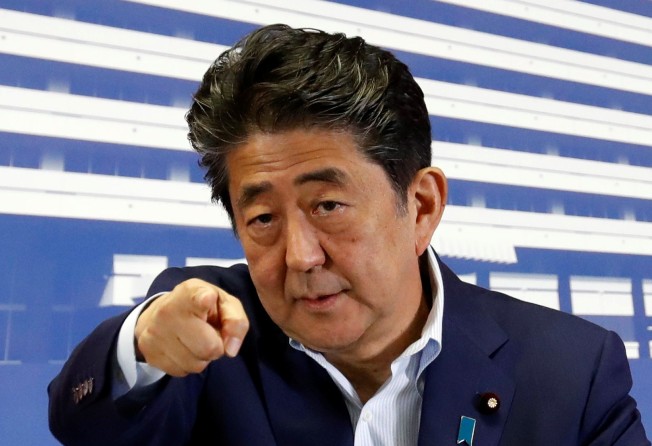Abe should forget his legacy and put the interests of Japan first
- The Japanese prime minister is determined to change the country’s pacifist constitution but there are other more important issues that should be addressed before his term ends in 2021

Being Japan’s longest-serving prime minister is not enough for Shinzo Abe; he also wants to be the first to change the country’s pacifist constitution. Proof of his continuing popularity was on show in elections to half of the seats of the upper house of parliament, with his Liberal Democratic Party and its coalition partner, Komeito, maintaining a strong showing. But the victory was bittersweet, his dream of a fully fledged military force being no closer with the parties falling short of the two-thirds majority needed to begin the process of revising the charter. He still wants to achieve that aim by the end of next year and is seeking support from opposition lawmakers, but would do better to put energies into issues that demand the attention of Japanese than deepening rifts in society and with neighbours China and South Korea.
Despite the setback, Abe pledged in his victory speech to push forward with his long-sought plans. He already has the two-thirds necessary in the lower house, but needs such backing in both houses so that a referendum that requires a simple majority can be held. His insistence is misguided given the result; there is clearly insufficient desire among Japanese.
The conservative prime minister has long vowed to amend the American-drafted constitution, written with Japan’s militaristic excesses before and during the second world war in mind, to widen the role of the self-defence forces beyond providing protection. His focus is on Article 9, the so-called peace clause, under which Japan renounces war and its right to maintain “war potential”. His rationale for revision is ensuring “pride of SDF personnel” and he contends that their role would not change. But China’s military modernisation and expansion, and North Korea’s missile and nuclear programmes are also of concern and nationalists want regular armed forces with strike capabilities.
But challenges abound in making revisions. Komeito is a Buddhist-centred party and its lawmakers and supporters are pacifists while opinion polls repeatedly show a majority of Japanese oppose changing the constitution. Such a move would also anger China, the Koreas and other nations which bore the brunt of imperial Japan’s excesses.
Warming ties with Beijing and President Xi Jinping’s visit next spring are too important to jeopardise, while preparations for the Tokyo Olympics next year will consume much political energy. Japan’s trade action against South Korea and the threat of penalties from the United States are further complications. Abe’s term as prime minister ends in 2021 and he is looking to his legacy. But he should put Japan’s interests first; too much is to be lost by pushing to alter the constitution.